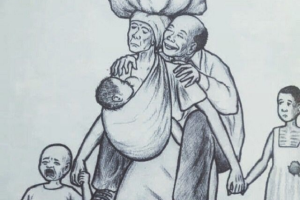
Born and raised in Addis Ababa, Bezawit Edilu is a Software Engineer. She has been giving Training of Trainers (ToT) on climate awareness, climate justice, circular economy and waste management in different European countries.
She is currently based here in the Capital, Addis Ababa, and is in the process of making the organization in Africa with partners. They have launched an ‘Eco Aware Youth’ initiative with the Union of Women and Children Association.
Previously, she used to engage in website development, app development and have been working with NGOs and the private sector.
Bezawit had a short stay with The Ethiopian Herald where she walked us through her life experience and career journey. Enjoy reading.
How do you end up working on climate awareness?
After the incident that occurred in ‘qoshe’ area in the capital, which took the lives of 70 people that resided in the area, a company named “Biruh Hills Development” which had the information that I used to volunteer reached out to me.
Not only the company that used to fund the organization quit funding, but their website was also blocked as the funding company left when they approached me. Through the process of supporting them technically, I became more aware of the climate and environment issue.
It goes without saying that most of us are not fully aware how to dispose wastes safely and in the right way. Starting from my experience, I used to take no caution to separate garbage when I take them out. I believe that is most people’s experience as well. But I started to grasp more information by working with the company. While working with the initiative, I was able to attend climate program training in Oxford University. That’s how my climate journey continued.
Could you tell us about the voluntary activities you have so far engaged in regarding climate awareness?
Currently, I am providing Training of Trainers (ToT) with the Union of Women and Children Association in Amhara, Tigray, Oromia and Central Ethiopia states. We are on the third round and targeting university students, lecturers, regional leaders, as well as people who are believed to have an impact on the environment.
The major objective is to alert people of the environment and allow them to see the problem from their perspective be it education and field of work so that they could deeply understand the issue and come up with different solutions.
How do you assess the level of awareness regarding climate in Africa?
If we see the statistics, it says climate awareness in the African continent is around 40 percent. Nonetheless, I don’t think we have that percent of people that have adequate knowledge or awareness about climate in Africa. Any irresponsible action we take can pile up and eventually affect the environment.
By simply looking at how we handle garbage in most cities in Africa, it could be said a lot about where we are in reality. I believe that most of the challenges on environment and climate arise from lack of awareness. There are people who still don’t understand that the little waste that is tossed out today can have a deeper impact at national level.
Though it is forbidden and there is an effort towards enforcing one-use plastic, it is still taking place in most cities. However, in Rwanda there is a good experience that encourages communities to use paper bags. Apart from making the price of plastic bags so expensive, consumers in South Africa will not receive plastics after purchasing goods from shops or supermarkets to the point where they are obliged to carry bread or any other thing openly in their hands if they do not take paper bags with them.
Here, it is to note that enforcement by itself might not be effective thus, the nation needs to take into account the importance of taking both the awareness raising and enforcement activities hand in hand.
Who do you think is the most responsible when it comes to climate and environment awareness issues?
Everyone is responsible. Back in campus, I organized a climate acetone event and reached out to students to see the environment in their field of study and come up with ideas that are useful. Surprisingly, the students came up with several technologies that were impactful for the environment as well as climate.
The issue of environment and climate cannot be left to a single entity. We all have a part to play and we are expected to exert responsibility in our profession.
What kind of mechanism should be put in place to mobilize people, especially youth, women and children?
Back in the days, it was the people who were in higher positions or hierarchy that used to implement policies or regulations. Much was expected from the youth to fit into something. Fortunately, different organizations are now emerging that aspire to engage youths and want to become their voice.
Children are the most interested segment of the society on climate awareness. We can’t enforce or impose awareness on people. For example, anything you teach children in school about climate will not only be fun to learn but also enhance their awareness.
I worked on a workshop in Ireland with grade 5 students. The task we gave them was to do art using papers. They came up with art by cutting the papers. Then, we asked them if they could come up with something else using the waste papers. They reused the paper and created different arts. That was how we taught the kids.
There is also a new technique that allows reusing paper by demolishing the color it was already printed on; however, it is not still applied in our country. As we use new papers, we are cutting new trees. If we reuse exam papers, it would be win-win. And, there are different innovations that are surfacing around the globe.
What do you suggest that the gov’t, stakeholders and concerned entities need to do to work with the youth?
Opening the space and making it inclusive is crucial. The more you engage people (Youth), the better new ideas flourish. There is new regulation that huge organizations formulate be it Agenda 2030 or 2063. The aforementioned agendas need to be more inclusive where the youth can freely express new ideas and concerns. The United Nations have implemented such an application that allows youth to take part. A toll call could be implemented in order to enable youth to have their say regarding essential issues.
As the saying goes, raising awareness on the most pressing environmental issues of our time is more important than ever.
Thank you!
BY BETELHEM BEDLU
THE ETHIOPIAN HERALD THURSDAY 16 MAY 2024





